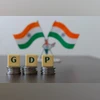India's economic growth is expected to have slowed in the April-June quarter due to reduced government spending during the national elections and stalling consumption.
A Reuters poll of 52 economists projected GDP growth of 6.9 per cent year-on-year for the three months through June, the first quarter of India's 2024/25 fiscal year. That is below the central bank's estimate of 7.1 per cent and the 7.8 per cent growth rate of the previous quarter.
If the projection holds, India will remain the world's fastest growing major economy. Official GDP growth figures for recent quarters have consistently exceeded forecasts.
For the full fiscal year, the central bank expects the economy to grow 7.2 per cent, slower than 8.2 per cent growth the previous year, dragged down by a contraction in state spending and the central bank's tightened rules on retail loans.
The government is due to announce GDP figures for the April-June quarter on Friday at 1200 GMT.
Garima Kapoor, an economist at Elara Capital, said uncertainty surrounding the general elections negatively affected infrastructure and capital expenditure in the June quarter, but economic activity was recovering.
More From This Section
"Our real sector indices continue to signal a steady and healthy economy, led by consumption."
Government spending in the June quarter fell 7.7 per cent on year, compared with a 10.8 per cent increase during the same period a year earlier, she said.
Political uncertainty also weighed on investment and consumption during the April-June quarter, Mumbai-based brokerage Axis Capital said in a note.
After a setback in the general election, Prime Minister Narendra Modi increased spending with a $576 billion annual budget. The budget included billions of dollars for affordable housing and rural jobs, aimed at boosting the economy.
Economists expect that favourable rainfall this year will enhance farm output, rural incomes, and consumer demand, a trend reflected in the increased sales of two-wheelers and tractors in July.
"At this stage, this weakness would be attributed to election-related uncertainty and slowdown in government spending," Axis Capital said.
"However, if growth momentum does not improve in the next few months, the annual growth forecast of 7 per cent could be at risk."
However, economists warned that a tight monetary policy could also constrain growth.
Earlier this month, the Reserve Bank of India (RBI) maintained its policy rate, focusing on sustainably reducing inflation towards its 4 per cent medium-term target.
Despite strong growth relative to other economies, India is lagging on job creation and more inclusive economic growth, which has weighed on wages and consumption of lower income households as well as investments by private companies.
"It will take India 75 years to reach one-quarter of US per capita," said a World Bank report released earlier this month, adding "with growing demographic, ecological and geopolitical pressures, there is no room for error."
(
(Only the headline and picture of this report may have been reworked by the Business Standard staff; the rest of the content is auto-generated from a syndicated feed.)

)